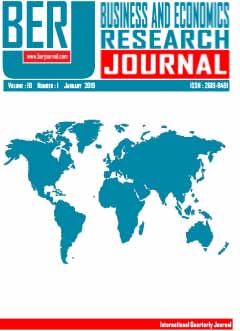BİST Endekslerinin Şoklara Kısa-Dönemli Tepkisi: Bir Makro Analiz
Short-Term Reaction of BİST Indexes to Shocks: A Macro Analysis
Author(s): Ali Ulvi Ozgul, Ibrahim Korkmaz KahramanSubject(s): Financial Markets
Published by: Adem Anbar
Keywords: Behavioral Finance; Overreaction Hypothesis; Underreaction Hypothesis; Efficient Market Hypothesis; EWMA Filtering;
Summary/Abstract: This research, which takes stock market index data as input in contrast to De Bondt and Thaler’s (1985) classical approach for testing overreaction hypothesis on a micro scale via individual stocks, is aimed at analyzing reactions of the market in aggregate and portfolio groups, which are represented by indexes. The shock-filtering procedure is based on 50-day window, encompassing observations from 60 days to 11 days prior to an observation as suggested by Lasfer et al. (2003) while volatility has been estimated through Exponentially Weighted Moving Average (EWMA) method. Indexes resembling each other and significantly differing from others in terms of their reaction on the day of shocks, which are detected by a different threshold have been determined. The analysis implemented separately for two subperiods outputs findings which support the validity of underreaction on all indexes except XUSIN within 2000-2008, in line with the reference researches on indexes. This result is, however valid only for positive shocks. The cautious behavior against good news disappears in the second subperiod (2009-2018). This variation can be regarded as a sign of our market’s progress in terms of information efficiency. Putting forth no significant over or underreaction of indexes to shocks, this paper shows results in compatible with the Efficient Market Hypothesis (EMH) which asserts just and timely reactions to shocks.
Journal: Business and Economics Research Journal
- Issue Year: 10/2019
- Issue No: 1
- Page Range: 55-75
- Page Count: 21
- Language: Turkish

